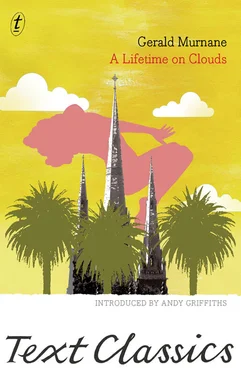Gerald Murnane - A Lifetime on Clouds
Здесь есть возможность читать онлайн «Gerald Murnane - A Lifetime on Clouds» весь текст электронной книги совершенно бесплатно (целиком полную версию без сокращений). В некоторых случаях можно слушать аудио, скачать через торрент в формате fb2 и присутствует краткое содержание. Год выпуска: 2013, Издательство: Text Classics, Жанр: Современная проза, на английском языке. Описание произведения, (предисловие) а так же отзывы посетителей доступны на портале библиотеки ЛибКат.
- Название:A Lifetime on Clouds
- Автор:
- Издательство:Text Classics
- Жанр:
- Год:2013
- ISBN:нет данных
- Рейтинг книги:3.5 / 5. Голосов: 2
-
Избранное:Добавить в избранное
- Отзывы:
-
Ваша оценка:
- 80
- 1
- 2
- 3
- 4
- 5
A Lifetime on Clouds: краткое содержание, описание и аннотация
Предлагаем к чтению аннотацию, описание, краткое содержание или предисловие (зависит от того, что написал сам автор книги «A Lifetime on Clouds»). Если вы не нашли необходимую информацию о книге — напишите в комментариях, мы постараемся отыскать её.
Earnest and isolated, tormented by his hormones and his religious devotion, Adrian dreams of elaborate orgies with American film stars, and of marrying his sweetheart and fathering eleven children by her. He even dreams a history of the world as a chronicle of sexual frustration.
A Lifetime on Clouds — читать онлайн бесплатно полную книгу (весь текст) целиком
Ниже представлен текст книги, разбитый по страницам. Система сохранения места последней прочитанной страницы, позволяет с удобством читать онлайн бесплатно книгу «A Lifetime on Clouds», без необходимости каждый раз заново искать на чём Вы остановились. Поставьте закладку, и сможете в любой момент перейти на страницу, на которой закончили чтение.
Интервал:
Закладка:
The luckiest boys went off to monasteries as soon as they reached puberty. In a monastery a boy had so many beautiful things to inspire him that he soon forgot about women. Every day as he walked in procession along the cloisters, he glimpsed through the narrow gothic windows the rolling hillsides covered with fruitful vines or grazing cattle. Every morning he saw the ordained monks each bent over his private altar in the shadowy nooks behind the high altar of the monastery chapel. When the sunlight flashed from the bulky silver of the chalices, and the folds of the elaborate vestments hissed against each other, he knew he would never wish for a greater pleasure than to say mass alone like that each day.
If a boy stayed at home he still had fewer temptations than a modern boy, because he was hardly ever alone. The whole village worked together all day in the fields. And the itinerant Franciscan and Dominican friars wandering up and down the roads of Europe kept a sharp lookout for young fellows mooning around in copses or thickets.
For centuries, Europe was hardly troubled by sex. Her most imaginative young men devoted all their energy to making gold and silver ornaments or stained-glass windows or religious paintings or illuminated parchments.
Historians were right when they said the Modern Age began with the Renaissance. Nude paintings and statues began to appear, even in the most fervently Catholic countries. And many of the female nudes were almost as attractive as twentieth-century film stars.
A young man of the Renaissance would have had many of the sexual problems that bothered Adrian Sherd. Even in those days, artists and sculptors had discovered the tricks that were used by photographers for Health and Sunshine magazine. The female statues had smooth marble between their legs and the women in the paintings stood in tantalising poses that did not quite reveal all.
The generation that grew up during the sexual excitement of the Renaissance became more and more resentful of the Church’s strict attitude to impurity. These were the people responsible for the Protestant Revolt.
The most important changes made by the Protestants were to remove two institutions which had been a nuisance to the sexually lax. They abolished the celibacy of the clergy and the sacrament of confession.
Martin Luther himself was a priest. Why was he so anxious to do away with the vow of celibacy? Because he himself wanted to marry. And why was he in such a hurry to get married? Adrian had heard many times from priests and brothers that Luther was an unhappy tormented man who should never have become a priest in the first place. It was common knowledge that he was a glutton and used foul language. It wasn’t hard to imagine such a man having terrible battles against impure temptations. The woman he eventually married was an ex-nun. What if he had known her, or at least caught sight of her, while he was still a Catholic priest? Was it possible that all his troubles with the Church first started when he realised he couldn’t stop thinking about a certain pretty woman?
Adrian had arrived at an explanation for the Protestant Revolt. He believed it was quite likely that the whole thing had been started by a priest who was tempted beyond his endurance to commit a sin of impurity by himself. Adrian found it almost too shocking to think about. He would never have repeated it to anyone, not even a Protestant, because it reflected on the sacred office of the priesthood.
It was a fateful day in the history of impurity when the Protestant leaders decided that it was no longer necessary to go to confession to have your sins forgiven. In drab cities all over northern Germany young men suddenly realised that what they thought about in bed at night need never be revealed to another living soul. They could do what they liked all week and still stand up on Sunday and sing hymns at the tops of their voices and look the minister in the eye.
The doctrine of predestination was all that a young man could wish for. Once he knew he was one of the elect, he could sin every night of his life and still be saved. If Adrian Sherd could have been born in Geneva in the great days of Calvinism he would have found religion a pleasure instead of the worry it was to him in twentieth-century Australia.
In the Protestant half of Europe, the Middle Ages were swept away forever. In Italy, Spain, Poland and the other Catholic countries, things were much the same as before except that many a young man must have wanted to migrate to a Protestant land.
When the Catholics and Protestants reached the New World, it was easy to see which religion was easier to live under.
At the beginning of the Modern Age, a young Spaniard no older than Adrian stood beside the Rio Grande and looked north-east across unexplored territory. The plains before him stretched away through Texas and Kansas and on to Nebraska and far Iowa. It should have been a stirring sight, but the young Spaniard was deeply troubled. He foresaw all the afternoons when he would stand alone by clear streams among miles of waving grasses and remember girls and women he had seen in old Castile and feel the overpowering urge to commit a sin of impurity. By the time he had explored the American prairies he might have had a hundred sins on his soul. When he got back to a Spanish city he would have to go to confession. It was a terrifying prospect.
At the same time, a young English gentleman looked westwards from a hilltop in Virginia. He was eager to explore all he could of the great continent before him. He would be a long time alone in the forests and prairies, but he knew a trick to cheer himself up at night. While he did it he would remember the pretty young ladies he used to admire each Sunday in his little parish church in Devon. Or he could look forward to the day when he arrived back in England and shook hands with the minister and sat down in his old family pew and looked round to choose one of the young ladies for his wife.
Late one Sunday afternoon Adrian was lying on his bed in his room at the back of the house. The sky outside his window was full of high grey clouds. A strong wind thumped the outside of the house and rattled a piece of timber somewhere in the wall. Adrian’s mother and his youngest brother were away visiting one of his aunts. His father was dragging a plank backwards and forwards across the backyard trying to level the sandy soil before he sowed it with lawn seed. Adrian’s younger brother was on the path at the side of the house, bouncing a tennis-ball against the chimney.
Next door, Andy Horvath and his wife and two or three other couples were having some kind of party in the bungalow behind the Horvaths’ half-built house. At about three o’clock they had started singing foreign songs and they were still going strong. There was one song they kept coming back to. Adrian had heard it three or four times already. The way they sang the chorus made the hair prickle on the back of his neck. It was sad and savage and hopeless.
Adrian thought of all the quiet backyards stretching away for miles in every direction. Then he thought of America.
He went outside to the shed and sent his passenger train around the track. It stopped in the Catskill Mountains. He went back inside to his bed and pulled a rug over himself and thought about the green mountains of New York State.
Sherd grabbed Gene and Ann and Kim firmly by their wrists and bundled them into his car. He told them they were going to the Catskills just for the hell of it. Soon they were among steep hillsides where shady forests alternated with lush green meadows. Sherd stopped the car beside a lofty waterfall that hung like a veil of silver over a secluded glade.
He didn’t waste time with idle chatter or a picnic lunch. As soon as they reached the little glade he told the women to get undressed. For some reason Gene and Ann and Kim wanted to tease him. They ran a little way into the trees and stood laughing at him.
Читать дальшеИнтервал:
Закладка:
Похожие книги на «A Lifetime on Clouds»
Представляем Вашему вниманию похожие книги на «A Lifetime on Clouds» списком для выбора. Мы отобрали схожую по названию и смыслу литературу в надежде предоставить читателям больше вариантов отыскать новые, интересные, ещё непрочитанные произведения.
Обсуждение, отзывы о книге «A Lifetime on Clouds» и просто собственные мнения читателей. Оставьте ваши комментарии, напишите, что Вы думаете о произведении, его смысле или главных героях. Укажите что конкретно понравилось, а что нет, и почему Вы так считаете.












